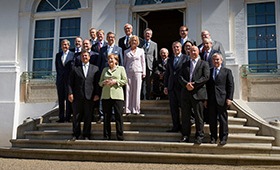“Economy 4.0 – a chance for vocational education and training”
President Esser attends the Federal Government’s Future Debate session

“Economy 4.0 is the opportunity to make vocational education and training more attractive in Germany again,” stressed Prof. Dr. Friedrich Hubert Esser, President of the Federal Institute for Vocational Education and Training (BIBB). Professor Esser was speaking at the 6th Future Debate staged at Meseberg Palace, the official state guest house of the German Federal Government, where he was one of the participants invited by Federal Chancellor Angela Merkel to attend a debate between the government and the social partners on the “effects of digitalisation on the world of work and on training”. Mrs. Merkel herself took part alongside seven federal ministers, the presidents of the Federation of German Industry (BDI), the Federal Association of German Employer Associations (BDA), the German Confederation of Skilled Crafts (ZDH) and the chair of the German Confederation of Trade Unions (DGB) together with the leaders of the service sector trade union ver.di, of the industrial union IG BCE and of the umbrella union the German Civil Service Federation (dbb).
In his presentation, BIBB President Esser expressed the view that that Economy 4.0 would lead to a stronger interlinking of occupations with modern technology. Permeability between educational areas previously separated would become the norm. President Esser went on: “This will make vocational education and training more prestigious and attractive again, especially amongst young people.” He stated that the face of the VET system would change. More cross-sectional provision, dual courses of higher education study, additional qualifications and occupational families, a systemic interlinking of initial and upgrading training and greater international usability of occupational knowledge combined with more attractive employment opportunities would all lead to the accordance of greater esteem to vocational education and training within society. “From a VET policy point of view, therefore, we now need to pursue activities which drive forward the cross-system process which has already started for the further development and implementation of occupational profiles that are appropriate for Economy 4.0.”
Economy 4.0 challenges the adaptability of the vocational education and training system
Professor Esser went on to say that occupations would be differently affected by the speed and extent of the changes. These changes would relate both to everyday work and the qualifications processes. He was of the view that fundamental IT competences, including knowledge of processes, systems and troubleshooting, would become standard skills for future occupational profiles. New work requirements along the value-added chain would not only lead to different demands in terms of competence. They would also be crystallisation points for new hybrid qualification options. Professor Esser firmly believed that permeable career concepts and occupational families were suitable structural concepts in order to be able to adopt qualifications with Economy 4.0 relevance across all levels of the German and European Qualifications Frameworks.
Training for Economy 4.0 requires strong learning environments
BIBB President Esser also made it clear that he saw digital forms of teaching and learning as essential in terms of fostering Economy 4.0 competences. Companies providing training, vocational schools, inter-company training centres and institutes of higher education would all need to have the appropriate equipment at their disposal. “Initial and advanced training provision that is in line with requirements can only be secured at a local level if cooperation between learning venues is developed further via digital platforms.” Within this context, Professor Esser called for all school leavers to be in possession of IT competence that offered connectivity in terms of entering vocational education and training. “This is, however, an area in which we need to catch up. According to the International Computer and Information Literacy Study (ICILS), Germany occupies only a mid-table position with regard to computer and information-related competences.”
In order to be able to instigate the necessary change processes in regional educational networks rapidly whilst maintaining the desired quality, the main requirement would be for trainers and vocational school teachers who were in possession of the appropriate competence. “For this reason, the highest priority must be given to the training and continuing training of staff.” Professor Esser warned that the increasing demands placed on companies could mean that small and medium-sized enterprises (SME’s) in particular would no longer provide training. Inter-company training centres innovation equipped with modern technology, able to drive innovation and offer a supplementary and quality assurance function were, therefore, indispensable. Such centres were also ideal for the rapid delivery at a local level of requirements-specific continuing vocational education and training for Economy 4.0.
BIBB providing support for the systematic occupational development process
Professor Esser concluded his remarks by pointing out that current studies and projects relating to Economy 4.0 were already in progress at BIBB. The institute was, for example, working in conjunction with Volkswagen AG to investigate and identify change requirements within this particular occupational spectrum by taking the work tasks and activity profiles in the areas of routine repair and maintenance of production systems as an example and comparing these tasks and profiles with existing occupational profiles. The project results would subsequently be jointly analysed with the Federal Government, the federal states and the social partners, and discussions would take place with regard to their transfer relevance. In addition to this, BIBB was currently analysing skills requirements in the IT branch with a possible view to realigning IT occupations. According to Professor Esser, the findings which emerged here could also serve the purpose of specifying qualification needs in other occupations and branches. “The effects of the 4.0 qualifications in the occupational system will tend to mean that many existing occupational profiles and structures will change,” emphasised Professor Esser. “I do not, however, anticipate that a large number of completely new occupations will be created. The present occupational mix offers more than 300 dual training occupations and constitutes a sufficient basis for the further development of the occupational system.”